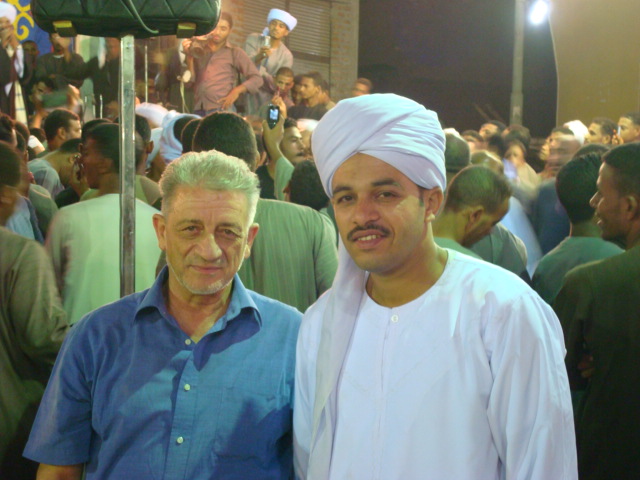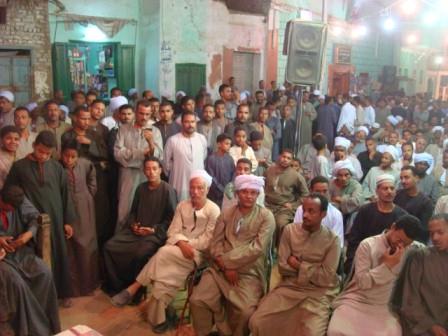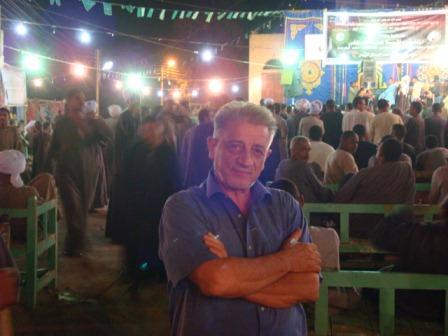Daniel Comboni
Comboni Missionaries
Institutional area
Other links
Newsletter
Rome, Monday, October 3, 2011
Fr. Giuseppe Scattolin tells us an extraordinary experience from mission in Egypt. The Comboni missionary writes: “I think that talking of God’s love to more than thousand Sufis is not a common experience for any Christian, all the less when one is a priest. However, this happened to me on the 21st-23rd - September - 2011.
The invitation came from the sheikh Hussein, leader of a local Sufi brotherhood (in Arabic tariqa), based in a village of Upper Egypt, called Busayliyya, north of Edfu, a well-known town of the region famous for its pharaohnic temple almost intact. The occasion was the commemoration of the founder of the tariqa, the sheikh al-Bayyumi (died in 1938), after whom it was named “Bayyumiyya”. Such types of festivals are common near the shrines where the relics of Muslim saints rest. These are venerated by common people (especially in the countryside), a practice often opposed by many legalistic doctors of Islam, and especially by many movements of the so called political Islam, who are inclined to a literal reading of the basic religious texts.
At the basis of all, there was the book on Sufism I have been working on for years, through studies, publications and, especially, through the publication of the Anthology of Sufi Texts, entitled “Spiritual Manifestations of Islam”. This book was met with great success at all levels. It has been prepared with the assistance of my former student and now my colleague (he has obtained the PhD in Sufism) Ahmed Hasan Anwar. Through it a lot of doors were opened, like invitations to meetings and symposiums, and the start of dialogue with a great number of Muslims. After all, through my studies I have gained the fame of a competent and serious scholar of Islamic Sufism in scholarly milieus.
Invited to this meeting or Sufi festival of Busayliyya with my colleague, we took part in their celebration in the presence of a large crowed, local and not, since all Sufi brotherhoods of Upper Egypt had been invited. In that grandiose night, the night of Thursday the 22nd of September, the number of people present was estimated at around 2000, more o less, but surely over 1000. The celebration continued from 11pm to 4am, early morning (fajr). A famous local Sufi singer, Amin al-Dishnawi, sang at full voice for five hours, while people in the square performed dances in increasing excited movements till the point of trance, which they call ecstasy, i.e. meeting with God.
They asked us to speak about Sufism at the beginning of the ceremony so as to elucidate to those simple people, who live this experience at a rather emotional level, how to counteract the accuses thrown on it by the juridical and legalistic milieus, known for their strict ‘literal’ reading of the sacredness of Islam.
In my lecture I underlined some important aspects of Sufism, or Islamic mysticism. The first is the primacy of spirituality over rituality. It is not enough to perform exterior ceremonies without a deep conversion of the heart. This is a quite common and basic topic in Sufism, as well as in any serious spirituality. On such a topic there are a lot of important Sufi texts one has to know in order to help people in finding their true journey in the spiritual path. Then I underlined the topic of love for God and of God; a love open to all humankind and to the whole universe. I showed, on the ground of many Sufi texts, how for the most outstanding Sufis such a love must be considered the apex of spiritual love. Here too, a good knowledge of Sufi literature is required in order to convince people through their spiritual background. The topic of love in particular must have touched that ‘popular’ audience. In fact, afterwards many of people’s comments, starting from our host Sheikh Hussein, underlined the fact that they had been inspired by the topic of love.
My colleague Ahmed elucidated in his lecture some points concerning the origin of Sufism, the meaning of the name ‘Sufi’, its position in the Islamic tradition, and so on. The conclusion of all this was that, contrary to what is often reiterated in many milieus, Islamic as well as others, Sufism is not a marginal movement in Islamic history, but it is an integral part of it. To eliminate Sufism means, in the end, to deprive Islamic history of much of its important manifestations in the fields of literature, art, poetry, etc. Sufis have always been a source of inspiration in art and in thought in all fields. Moreover, Sufi brotherhoods have always had a very important formation role inside the Islamic community at all levels. Among Sufis one can find many important ‘educators’ in humanity and religion, as well as great thinkers, such as Ibn ‘Arabi (died in 1240), called the ‘Greatest Sufi Master’, one of the most read authors at global level.
Back in Asswan, I had a great surprise. We were walking through the market (suq) when a man carrying a child and holding another by hand, approached us. At first, we thought him to be one of the usual beggars. Instead, he started thanking us for the words we said in the Sufi festival he had attended. Then he presented himself as the sheikh of the nearby mosque, not far from our Catholic Church. He invited us to visit him in his mosque and, surely, the following evening we were there. He made me sit on the chair of preachers and for over two ours we exchanged on the importance of Sufism, spiritual life, love and similar topics.
I think I am not so naïf as to think that a lecture is enough to change the heart and behaviour of people. But I think that it is a positive sign the fact that they had willingly listened to a message delivered by a Christian, and even more by a Christian priest. They showed interest in the topic about love, and expressed the wish to hold other meetings. It is my deepest conviction that spirituality is one of the most important aspects for dialogue among religions, Islam in particular.
The Spirit blows wherever he wants... It is better to let him blow…We are just instruments of his action… We have just to pray that he may enter in the heart of all, making the life of the Kingdom of God grow in all, especially by living the basic commandment of love: love God and love your neighbour.
In sha’ Allah
Giuseppe Scattolin






